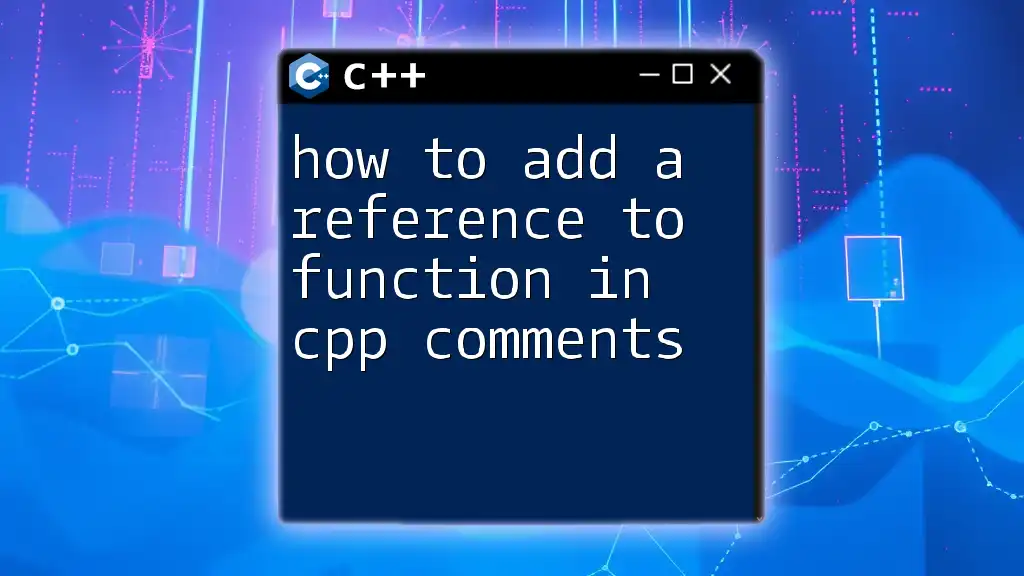In C++, you can add a reference to a function in comments by using the `&` operator to indicate that the function argument is passed by reference, allowing modifications to the original argument.
// Function that takes an integer by reference
void increment(int &value) {
value++;
}
Understanding C++ Comments
What Are C++ Comments?
C++ comments are snippets of text within your code that are not executed during runtime. They serve as explanatory notes for anyone reading the code, helping to clarify functionality, logic, or complex operations. There are two primary components of C++ comments:
-
Single-Line Comments: Initiated by `//`, everything following this syntax on that line is ignored by the compiler. This is ideal for simple or brief explanations.
-
Multi-Line Comments: Delimited by `/` and `/`, this syntax allows you to write comments spanning multiple lines, useful for detailed descriptions or clarifications.
The Importance of Commenting Functions
Why Comment Functions?
Commenting functions is crucial in any programming language, especially C++. A well-commented function can significantly enhance code maintainability and collaboration between developers. Clear, concise comments help prevent misunderstandings and reduce the time spent deciphering complex logic, making it easier for anyone—be it your future self or other team members—to grasp what a function is intended to do.
Best Practices for Commenting
- Use straightforward, unambiguous language. Avoid jargon that could confuse readers.
- Maintain consistency in your formatting style throughout the codebase.
- Steer clear of redundant comments that merely restate what the code does, which can lead to clutter.
Structured Approach to Adding References in Comments
Include Relevant Function Information
When referencing functions in comments, it’s essential to maintain a clear and systematic approach. A well-structured comment can include relevant details such as the function name, its purpose, and any references to external documentation sources. Consider the following example:
// Function: calculateSum
// Purpose: Computes the sum of two integers.
// Reference: [Link or documentation source]
void calculateSum(int a, int b) { /*...*/ }
This format ensures that anyone reading the code can quickly ascertain what the function is supposed to accomplish and where to find further details.
Citing External References
Linking to external documentation or resources can provide additional context and sources for those who need in-depth information. Here is how to incorporate a link into a function comment:
// Function: processData
// Reference: More info available at: https://example.com/documentation
void processData(const std::vector<int>& data) { /*...*/ }
Such comments allow developers to access supplementary information seamlessly.
Using Docstrings in C++
In addition to traditional comments, utilizing docstrings can greatly enhance your documentation. Docstring-style comments are ideal for functions as they allow for structured details such as parameters, return types, and descriptions.
Many C++ developers leverage libraries like Doxygen to facilitate this. Here’s an insightful example using Doxygen-style docstrings:
/**
* @brief Multiplies two numbers.
*
* This function takes two integers and returns their product.
* @param x First integer.
* @param y Second integer.
* @return Product of x and y.
*/
int multiply(int x, int y) {
return x * y;
}
By employing this format, you can quickly generate documentation that provides a clear overview of each function's responsibilities and behaviors.
Practical Examples of Referencing Functions in Comments
Real-World Example: Utility Functions
Let's demonstrate how to effectively comment on utility functions. Below is an example where we fetch user data. Notice how the comments lead the reader to understand the function's purpose clearly and the reference to additional material.
// Function: fetchUserData
// Retrieves user data from the database.
// Reference: Documentation available at: https://example.com/userdata
User fetchUserData(int userId) {
// ...
}
This example not only describes what the function does but also points the reader to external documentation that could provide fundamental insights into its implementation and usage.
Complex Function References
Commenting becomes even more critical with complex functions that involve multiple parameters and intricate logic. Here’s how to provide comprehensive comments that address potential pitfalls:
// Function: updateAccountBalance
// Updates the account balance after a transaction.
// Reference: See also: Account class (Account.h)
// Warning: Ensure adequate funds before calling this function to avoid overdraft.
void updateAccountBalance(Account& account, double amount) {
// ...
}
In this case, the comment references another related class and explicitly warns users about a potential error. This clarity aids developers in utilizing the function correctly.
Tools and Resources for Documentation
Using Documentation Generators
To streamline the documentation process, consider employing documentation generators like Doxygen or Sphinx. These tools automatically generate documentation from your comments, allowing you to maintain an organized codebase while also generating user-friendly documentation that can significantly improve usability.
Online Resources for Commenting Best Practices
Various articles, tutorials, and books are available that elaborate on best practices for commenting in C++. Engaging with these resources can provide further insights, helping enhance your coding standards.
Conclusion
In summary, effectively commenting on functions in C++ is vital to ensuring code clarity and maintainability. Understanding the structured approach to adding references can considerably enhance the usability of your code, making it easier for others to navigate and understand. Always remember to keep your comments clear, concise, and actionable.
Call to Action
I encourage you to implement the practices discussed here in your own C++ projects! Feel free to share your commenting techniques or any questions you may have in the comments section. Be sure to subscribe for more useful C++ tips and tricks that can elevate your coding proficiency.
Additional Resources
For further reading, consider checking out related articles on our platform that focus on C++ best practices and documentation strategies. You can also download our cheat sheet for quick references on effective commenting!








